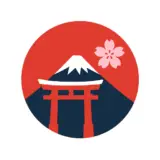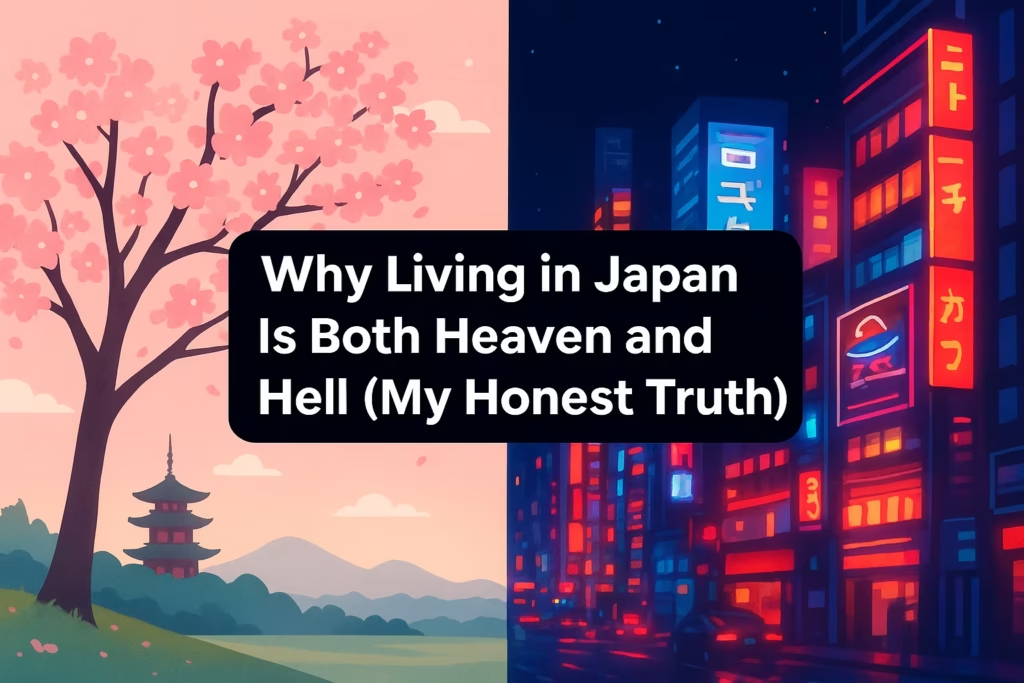The Dream vs. The Reality
When I first moved to Japan, I thought I had found paradise.
Everything was clean, safe, organized — trains arrived to the second, and even convenience store food tasted amazing.
It felt like stepping into the future.
But after a few months, I started to see the other side — the part tourists never experience.
And that’s when I realized: Japan is both heaven and hell, depending on where you stand.
If you want to know how this dream started, read my full story:
👉 How I Came to Japan: From Dream to Reality
🌸 Heaven: The Beauty, Peace, and Perfection
Let’s start with the part everyone falls in love with — the “heaven” side of Japan.
1. Everyday Life Feels Effortlessly Beautiful
Cherry blossoms in spring. Golden leaves in autumn. Neon lights reflecting on rainy Tokyo nights.
Even ordinary days feel cinematic here.
There’s a deep respect for detail — from perfectly wrapped gifts to bento boxes that look like art.
This quiet beauty is what keeps many of us here. I shared more about how Japan changed me over time in:
👉 5 Years in Japan and Still Learning Every Day
2. The Safety Is Unreal
You can walk alone at midnight, leave your laptop in a café, or forget your wallet on a train — it will almost always come back to you.
It’s one of the safest countries in the world, and that changes how you live and breathe.
3. Convenience at Its Best
Konbini (convenience stores) are magical.
You can pay bills, print documents, eat a hot meal, and ship a package — all in one place, open 24/7.
Japan has a quiet efficiency that makes daily life incredibly smooth.
🔥 Hell: The Hidden Struggles Nobody Tells You About
Japan’s perfection comes with pressure — and that’s where the “hell” side begins.
1. Loneliness Hits Hard
It’s peaceful, yes — but also quiet to the point of isolation.
People keep to themselves. Making friends, especially Japanese friends, takes time and patience.
The politeness can feel like distance.
There are days when you miss spontaneous laughter, casual conversations, or just being understood without words.
2. Work Culture Can Be Brutal
The famous Japanese “ganbaru” (work hard) mindset is inspiring — until you’re part of it.
Long hours, unpaid overtime, and indirect communication can wear you down fast.
Even if you’re a foreigner, you’ll feel the social pressure to conform.
If you’re considering working or studying part-time in Japan, here’s what it’s really like:
👉 How to Find a Part-Time Job (Arubaito) in Japan as a Student: A Realistic Guide
3. The Language Barrier Never Fully Goes Away
Even after years here, paperwork, hospital visits, or city hall tasks can feel like climbing a linguistic mountain.
English isn’t widely used outside major cities, and bureaucracy loves old-fashioned forms — handwritten, stamped, and in kanji.
If you’re wondering how far you can get without Japanese, I wrote an honest breakdown:
👉 Living in Japan Without Speaking Japanese — Is It Really Possible?
4. Social Rules Are Unspoken and Endless
There’s a rule for everything — when to bow, where to stand, how to speak, how to apologize.
And even if you try your best, you’ll still make mistakes.
Most people will forgive you, but it can feel exhausting to constantly wonder if you did something “wrong.”
⚖️ The Balance: Learning to Live in Between
Here’s what I’ve learned after five years — the goal isn’t to make Japan your heaven or to escape its hell.
It’s to find balance between the two.
The peace, safety, and kindness make you fall in love.
The isolation, pressure, and silence teach you patience.
You start appreciating both — the convenience and the challenge.
Japan slowly changes you. You become calmer, more observant, more respectful.
You learn that beauty isn’t loud — it’s quiet, consistent, and intentional.
🌅 Final Thoughts
Living in Japan isn’t easy, but it’s meaningful.
It’s not for everyone, and that’s okay.
Some people come for a year and leave with frustration; others stay for decades and still feel they’re learning.
If you come here chasing a dream, you’ll find reality.
If you come here seeking peace, you’ll find reflection.
And if you stay long enough, you’ll realize — Japan is not perfect, but it makes you grow.
Discover more from Ali in Japan
Subscribe to get the latest posts sent to your email.

